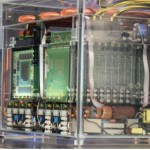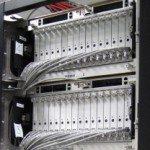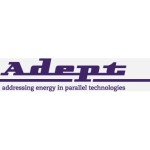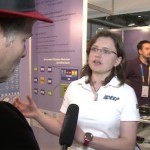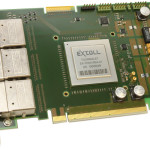In this video from ISC 2019, Thomas Lippert from the Jülich Supercomputing Centre describes how modular supercomputing is paving the way forward for HPC in Europe. “The Modular Supercomputer Architecture (MSA) is an innovative approach to build High-Performance Computing (HPC) and High-Performance Data Analytics (HPDA) systems by coupling various compute modules, following a building-block principle. Each module is tailored to the needs of a specific group of applications, and all modules together behave as a single machine.”
DEEP-EST Project Looks to Building-blocks for Exascale
The DEEP exascale research computing project has entered its next phase with launch of the DEEP-EST project at the Jülich Supercomputing Center in Germany. “The optimization of homogeneous systems has more or less reached its limit. We are gradually developing the prerequisites for a highly efficient modular supercomputing architecture which can be flexibly adapted to the various requirements of scientific applications,” explains Prof. Thomas Lippert, head of the Jülich Supercomputing Centre (JSC).
Video: 5 Petaflop Booster System from Dell EMC coming to Jülich
In this video from the Dell EMC HPC Community meeting in Austin, Thomas Lippert from the Jülich Supercomputing Centre describes their pending 5 Petaflop Booster system. “This will be the first-ever demonstration in a production environment of the Cluster-Booster concept, pioneered in DEEP and DEEP-ER at prototype-level, and a considerable step towards the implementation of JSC’s modular supercomputing concept,” explains Prof. Thomas Lippert, Director of the Jülich Supercomputing Centre.
How Intel Worked with the DEEP Consortium to Challenge Amdahl’s Law
Funded by the European Commission in 2011, the DEEP project was the brainchild of scientists and researchers at the Jülich Supercomputing Centre (JSC) in Germany. The basic idea is to overcome the limitations of standard HPC systems by building a new type of heterogeneous architecture. One that could dynamically divide less parallel and highly parallel parts of a workload between a general-purpose Cluster and a Booster—an autonomous cluster with Intel® Xeon Phi™ processors designed to dramatically improve performance of highly parallel code.
EXTOLL Deploys Immersion Cooled Compute Booster at Jülich
Today Extoll, the German HPC innovation company, announced that is has it has successfully implemented its new GreenICE immersion cooling system at the Jülich Supercomputing Centre. As part of the DEEP Dynamical Exascale Entry Platform project, GreenICE was developed to meet the need for increased compute power, density, and energy efficiency.
DEEP Project Unveils 500 Teraflop Prototype
The EU-funded DEEP Project has unveiled their innovative HPC platform: a 500 TFlop/s prototype system that implements a Cluster-Booster concept that has a lot in common with a turbocharged engine. The prototype operates with a full system software stack and programming environment engineered for performance and ease of use.
Adept Project Looks at Using Software to Conserve Energy
In this special guest feature, Tom Wilkie from Scientific Computing World writes that software approaches to energy efficiency in HPC may yield unexpected improvements in the hardware of next-generation mobile phone networks. “Adept, a European research project addressing the energy-efficient use of parallel technologies, is expected to release a set of benchmarks that it has developed to characterize the energy consumption of programming models on different architectures.”
DEEP Project Moves Towards Exascale at ISC 2015
“With this delivery, the DEEP consortium can leverage a supercomputer with a peak performance of 505 TFlop/s and an efficiency of over 3 GFlop/s per Watt. The Eurotech hot water cooling solution allows for additional permanent gains in energy efficiency at data centre level as it guarantees year-round free cooling in all climate zones. The system includes a matching innovative software stack, and six carefully selected grand challenge simulation applications have been optimized to show the full performance potential of the system.”
EXTOLL Rolls Out TOURMALET Network Chip at ISC 2015
Last week at ISC 2015, EXTOLL from Germany introduced its TOURMALET 100G network chip and PCIe Board.
Applications for the DEEP and DEEP-ER Projects
“To evaluate the DEEP concept and to prove its programmability, selected applications are ported to the DEEP system. They serve to test the system, to compare its performance with respect to standard architectures, and even to propose improvements to the system’s hardware and software.”





